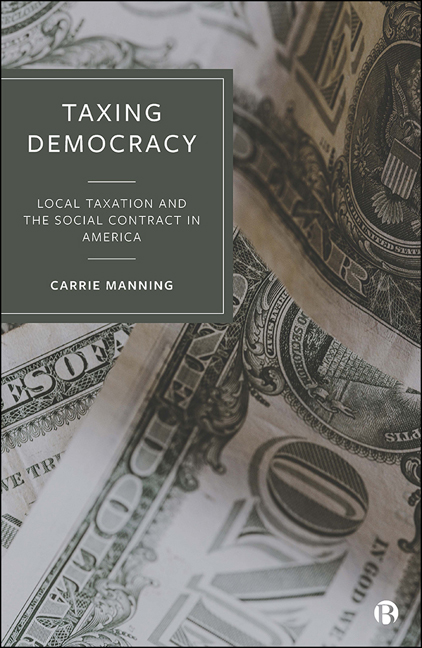Book contents
- Frontmatter
- Contents
- Acknowledgments
- 1 Taxes and the Social Contract
- 2 States, Taxes, and the Polities They Create
- 3 The US Tax State and the Limited Social Contract
- 4 Tax and Expenditure Limitations vs. an Expanding Social Contract
- 5 Implications of the Reliance on Fines and Fees
- 6 Taxing Democracy: Conclusions
- Notes
- References
- Index
5 - Implications of the Reliance on Fines and Fees
Published online by Cambridge University Press: 20 January 2024
- Frontmatter
- Contents
- Acknowledgments
- 1 Taxes and the Social Contract
- 2 States, Taxes, and the Polities They Create
- 3 The US Tax State and the Limited Social Contract
- 4 Tax and Expenditure Limitations vs. an Expanding Social Contract
- 5 Implications of the Reliance on Fines and Fees
- 6 Taxing Democracy: Conclusions
- Notes
- References
- Index
Summary
Introduction
Chapters 3 and 4 traced the long history of tax constraints in the United States, through the conservative tax revolts of the 1970s and 1980s. Chapter 4 examined the rapid spread of tax and expenditure limiting measures adopted by many states in the last quarter of the 20th century, beginning with California's Proposition 13 in 1978. As we have seen, the practice of limiting government spending and revenue collection–whether by statute or by constitutional amendment – has both political and fiscal motivations.
The conservative tax revolt popularized an anti-tax ideology in response to the civil rights movement and Great Society programs that threatened to expand the social contract and, by extension, the tax bargain. In response to this expanded social welfare role for the state, conservatives – first in the South, and then more broadly – asserted the narrow tax bargain that had long underpinned states in the South. With most US states having established statutory or constitutional limits on taxes and expenditures, local governments have shifted toward new forms of revenue generation that make the ‘tax bargain’ between governments and citizens less transparent, divorcing taxation from service provision.
This chapter focuses on one of the most pernicious effects of the artificial creation of fiscal scarcity through TELs – the use of law enforcement as revenue generation. The use of policing to generate government revenue, first through civil asset forfeiture, and then through traffic fines, court fees and other criminal justice fines and fees, as well as municipal ordinance infractions, has reinforced this low-tax, small government tax bargain. And, though the modalities of its implementation have been updated over time, this narrow tax bargain continues to be premised on the exclusion of racially and economically marginalized communities. Non-tax revenues raised through traffic citations and fines for minor infractions tend to fall disproportionately on people of color. In effect, these measures allow politicians and taxpayers to keep taxes low while singling out a marginalized class of people to help pay for essential services that are normally considered public goods.
When non-tax revenues take on a significant role in funding government, those paying the price for government services go from being taxpayers – a status associated with citizenship, belonging, and having ‘a stake in the community’ – to being users of services.
- Type
- Chapter
- Information
- Taxing DemocracyLocal Taxation and the Social Contract in America, pp. 91 - 107Publisher: Bristol University PressPrint publication year: 2023



